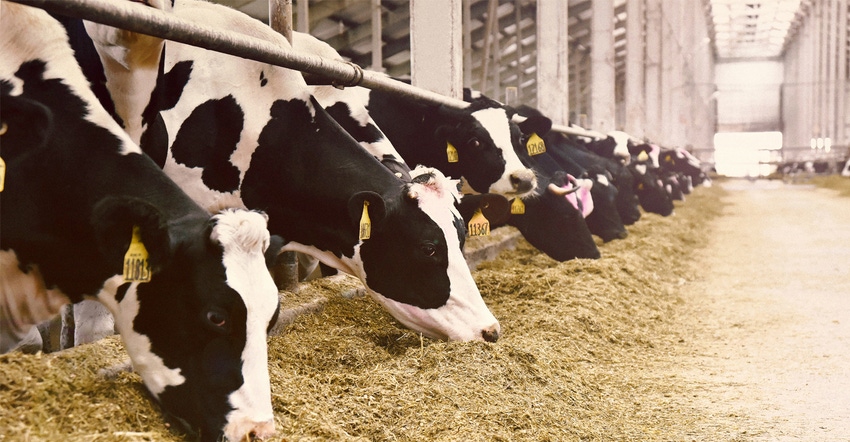July 21, 2021

The Karsky Dairy, owned by Dean and Lee Ann Karsky of Dickinson, N.D., is a business steeped in generational culture and value.
The fourth-generation dairy was established by Dean’s great-grandparents, Louie and Agnes Karsky, in 1945. It then transitioned to Dean’s parents, Ray and Darlene, in 1968. The next handoff was to Dean and Lee Ann in 1995. Dean and Lee Ann got their start by leasing cows from Ray and Darlene for $1 per day per cow, an affordable arrangement to get a start in the dairy business.
Financial investment
In 2002, Dean and Lee Ann invested $350,000 in a new dairy barn. They worked with Jerry Tuhy, a Farm Business Management instructor, to create cash flow projections that would show that the investment would pay for itself over time based on solid financials and production information.
Lee Ann says that lenders at the time were more willing to finance a beef operation than a dairy operation, and wanted documents that they could trust to make good lending decisions. The lenders respected the unbiased data put together with the help of an independent source.
The FinPack program helped the Karskys present a balance sheet and farm analysis to the lender, and continue to use FinPack along with accounting software for their financial record keeping.
Dean and Lee Ann have been participating in Bismarck State College’s Farm Management Education Program since 1998, and Lee Ann says they couldn’t get financing without the program when they first started the dairy. The program has also helped the Karskys secure capital for many other asset purchases since then, and has become an important component of their annual financial planning.
5th generation
The next generation is also participating in the dairy business. Dean and Lee Ann’s daughter, Rachel Howie, is the “herdsmen” of the operation.
Rachel has many responsibilities on the dairy that are vital to the success of the operation, including managing the cow herd and milk production, genetics selection, computerized dairy programs, and managing people.
Rachel went to Dickinson State University, where she received degrees in biology and environmental science. Rachel’s passion for the dairy industry and her love for cows eventually led her back to the family dairy. This love is being passed along to her two young sons, who also participate in showing 4-H dairy calves and own a few of their own calves.
The dairy barn has the capacity to hold 228 dairy cows and milks 200 head in a “double-10 parallel” system. The dairy’s herd is managed by placing the cows into four groups which enables the owners to manage cows and production more efficiently. They hold back all purebred heifers for future dairy production, and sell the bull calves.
The Karskys barn is home to Holstein, Jersey and Brown Swiss cows. Using three breeds gives the dairy the necessary volumes of milk production with high butter fat content. The dairy’s butter fat production of 4.3%, versus the national average of 3.5%.
Numerous challenges
History has proven that owning and operating a dairy has many challenges. It’s no surprise that finding employees and maintaining a stable workforce is the Karskys’ greatest challenge. Utilizing the Cultural Agriculture Exchange Program has been integral to help staff the dairy operation.
CAEP is an international program that brings employees to the dairy from around the globe, functioning as an apprenticeship program that is limited to one year at the dairy. COVID-19 has also had a negative impact on their ability to utilize CAEP and bring individuals to the United States.
The Karskys’ second major concern is the marketability of their milk products. All of their dairy production is marketed to Dairy Farmers of America (DFA), a cooperative dairy based out of Kansas City, Kan. The milk is picked up by the New Salem, N.D., location and then transported to Pollock, S.D. There, it is primarily used to make branded cheese products for Kraft and Borden.
Forward-contracting of milk production was once used heavily by the Karskys. Dean says 75% of their production was forward-contracted, but none is contracted today, due to contract complexities. The Karskys would like to see the availability of more marketing options.
The third challenge facing the dairy is what Mother Nature has to offer — drought. The region’s alfalfa is not starting out with vigorous growth, and current feed stock inventories are being monitored closely. A major concern for the Karskys is the current market value for purchasing dairy-quality hay.
Dean says that they recently purchased hay for June through September feeding, costing $200 per ton for second and third cuttings. If the rains don’t materialize, herd reduction conversations could take place.
Consumer education of dairy products is a constant effort by various dairy industry organizations such as Dairy Farmers of America. The general opinion is that the dairy organizations are doing an adequate job of educating the public about the safety and health benefits of dairy products, understanding that education is constant.
Lee Ann says, “Consumers need to understand and believe that dairy products are safe and healthy.”
Despite challenges and headwinds, the Karsky family says they are passionate about their dairy business and finding future opportunities. “Dairy is a way of life and culture that we all enjoy and love,” Lee Ann says.
The North Dakota Farm Management Education Program provides lifelong learning opportunities in economic and financial management for those involved in farming and ranching. Visit ndfarmmanagement.com, or contact Craig Kleven, state supervisor for ag education, at [email protected] or 701-328-3162 for more information. The ND Farm Management Education Program is sponsored by the North Dakota Department of Career and Technical Education.
Dragseth writes from Bismarck, N.D.
You May Also Like




